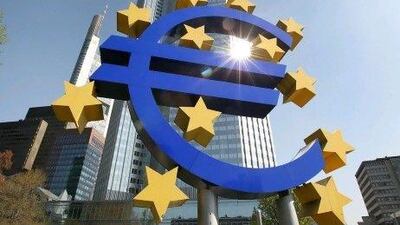Europe is already in a pickle, so why not add more vinegar? That seems to be the thinking behind the European Commission's (EC) proposed financial transactions tax (FTT) - the commission's latest response to Europe's festering growth and financing problems.
The emotional appeal of a tax on all financial transactions is undeniable. Ordinary Europeans have to pay value-added tax on most of the goods and services they buy, so why not tax purchases of stocks, bonds and all types of derivatives? Surely, such a tax will hit wealthy individuals and financial firms far more than anyone else, andraise a ton of revenue.
The EC estimates that its proposed tax of only 0.1 per cent on stock and bond trades, and 0.01 per cent tax on derivatives, will raise more than €50 billion (Dh245.74bn) per year. As a bonus, an FTT will curb destabilising speculation in financial markets.
If only it were so simple. Of course, taxation of financial firms' profits and bonuses should be made more similar to that of other economic activities. Excessive leverage needs to be reined in. A return to pre-2007 levels of macroeconomic and financial stability would support growth. Unfortunately, as much as FTTs are the darling of leading liberal economic commentators, they are an extremely misguided approach to achieving such worthy ends.
True, great thinkers such as John Maynard Keynes and the late Nobel laureate James Tobin floated various ideas for taxing financial transactions as a way to reduce economic volatility. (Tobin's tax applied specifically to foreign-exchange trading.) But since then, the idea has received close attention from many economic researchers, and frankly, it is hard to find their research results supportive.
Such taxes surely reduce liquidity in financial markets. With fewer trades, the information content of prices is arguably reduced. But both theoretical and simulation results suggest no obvious decline in volatility. And, while raising so much revenue with so low a tax rate sounds grand, the declining volume of trades would shrink the tax base precipitously. As a result, the ultimate revenue gains are likely to prove disappointing, as Sweden discovered when it attempted to tax financial transactions two decades ago.
Worse still, over the long run, the tax burden would shift. Higher transactions taxes increase the cost of capital, ultimately lowering investment. With a lower capital stock, output would trend downward, reducing government revenues and substantially offsetting the direct gain from the tax. In the long run, wages would fall, and ordinary workers would end up bearing a significant share of the cost. More broadly, FTTs violate the general public-finance principle that it is inefficient to tax intermediate factors of production, particularly ones that are highly mobile and fluid in their response.
All of this is well known, even if prominent opinion leaders, politicians and philanthropists prefer to ignore it. The EC has surely been strongly cautioned by the fiscal affairs department at the IMF, whose economists have thoroughly catalogued the pros and cons of FTTs. So why did the commission go forward with the idea?
The most generous interpretation is that the commission simply does not believe economists' estimates and analysis, and views an FTT as more workable than is commonly realised (a scenario that calls to mind the debate surrounding the creation of the euro.) It is true that Latin American governments, particularly the Brazilian authorities, succeeded in raising more revenue from taxes on bank withdrawals (a crude version of an FTT) than most policy analysts thought possible. On the other hand, Latin America's long-term growth record is hardly an advertisement for the approach, and accounting for lost tax revenues due to lower GDP would surely yield a less impressive fiscal outcome.
Another possibility is that the Europeans concluded that FTT's political advantages outweigh its economic flaws. After all, there certainly is a case to be made that an FTT has so much gut-level popular appeal that politically powerful financial interests could not block it.
There are more cynical interpretations of the EC's motives. Perhaps officials noticed that virtually everything in Europe is already heavily taxed. So, rather than finance the EU's institutions through greater contributions from existing tax bases, they are seeking a consensus for new revenue sources. Or perhaps the commission realises that the FTT will be dead on arrival, owing to disputes within Europe, and simply wants to gain political capital from an enormous popular proposal.
After the financial crisis erupted with full force in 2008, Paul Volcker, the former US Federal Reserve chairman, claimed that the only worthwhile financial innovation in recent decades was the ATM. And, as the Oscar-winning documentary Inside Job rightly points out, no one whose other, less useful innovations helped cause the financial crisis - politicians, financiers, and many others - has really paid a price.
In short, the FTT is no solution to Europe's problems - or to the world's.
Kenneth Rogoff is a professor of economics and public policy at Harvard University, and was formerly chief economist at the IMF
* Project Syndicate

